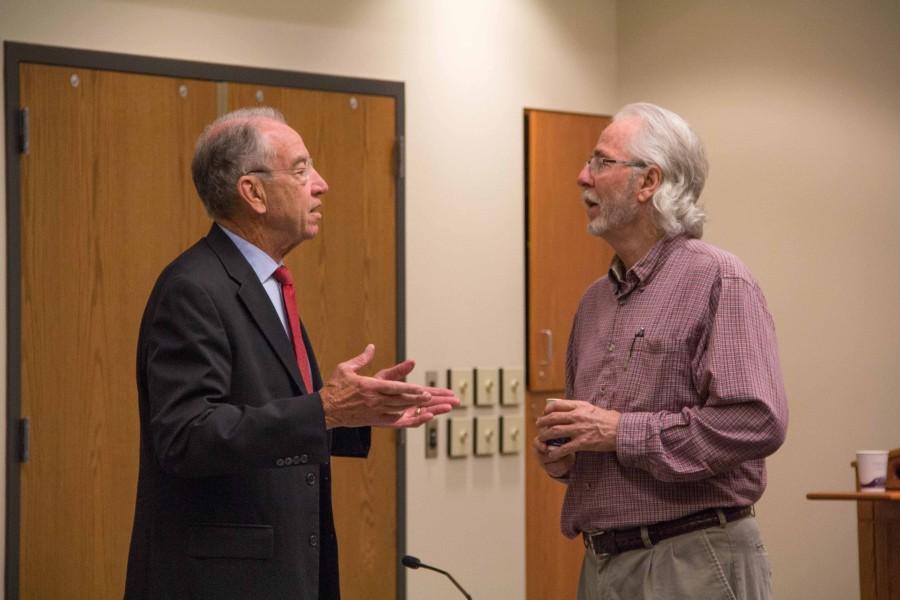Sen. Grassley discuss whistleblowers
Sep 17, 2015
This past Monday, UNI saw a politically busy day, with senators and a presidential hopeful on campus. The day kicked off in Maucker Union’s University Room at 8 a.m. with U.S. Senator Chuck Grassley and State Senator Jeff Danielson giving a talk about government whistleblowers. Both men have a long record of pushing for legislation at both the state and federal level and were visiting to spread their message of supporting whistleblowers.
Government whistleblowers are people who speak out against what they believe to be corruption or hidden information that the American people deserve to know. Both Grassley and Danielson have found a weakness in laws protecting these whistleblowers, especially at the state level. According to Danielson, when Iowa’s whistleblower laws were graded, they were given a C minus, largely due to the way Iowa’s whistleblower laws are structured.
In Iowa, when someone wants to speak about the misuse of funds or any other misuse of power, “the law requires you must go to your employer first,” according to Danielson. In many cases, this means going to the person who needs their behavior reported to file the report. This often results in adverse employment action inflicted on the whistleblower. In one case, a whistleblower was terminated “within 11 months of the report,” said Danielson.
Even with an independent reporting agency, there is not much to be done about protecting whistleblowers within the current system. The best advice given to whistleblowers is a two-page memo that, according to Danielson, “reads like a Stephen King horror novel.” It offers a warning and eleven steps the whistleblower can take to protect themselves from adverse action. Among 46 reported cases of adverse employment action, such as termination or suspension, the state government was able to resolve zero cases as a result of current protection laws in Iowa.
Another serious issue with Iowa’s whistleblower protections is the inability to go directly to the media, Danielson said.
In the information age, it seems outdated to restrict people from posting any information on the Internet or going to a newspaper or journalist about any political accusations. The ability for a whistleblower to go directly to the media about a suspected problem, and a strong agency outside of the organization where the problem lays, were the two key components of a strong whistleblower protection program that Senator Danielson highlighted.
The federal government has had more success protecting whistleblowers in the past. At the federal level, the main talking point has been balancing national security with protecting the citizens who seek to eliminate corruption. Since 9/11, national security has been tightened and surveillance, especially over the Internet, has been expanded.
This discussion of protecting citizens from harm, versus giving them the right to privacy and the right to speak out, has created a political schism ranging in favor of no government surveillance to almost complete government surveillance.
Senator Grassley spoke largely about the expansion of current laws to include more cases. He expressed the necessity of protecting what he feels is “an important check and balance on the United States government.” To some Congresspersons like Grassley, protecting whistleblowers is critical to maintain transparency in the national government. But to the opponents of such protections, whistleblowers are a greater threat to national security than they are a positive check on the government.
The most prominent example of this is, when Edward Snowden leaked information about the NSA’s mass surveillance of Americans.
While Grassley acknowledged that some exemptions are necessary to protect the American people, he believes these exemptions are the minority.
“If we had better whistleblower protections, Snowden wouldn’t have had [to flee the country],” said Grassley.









